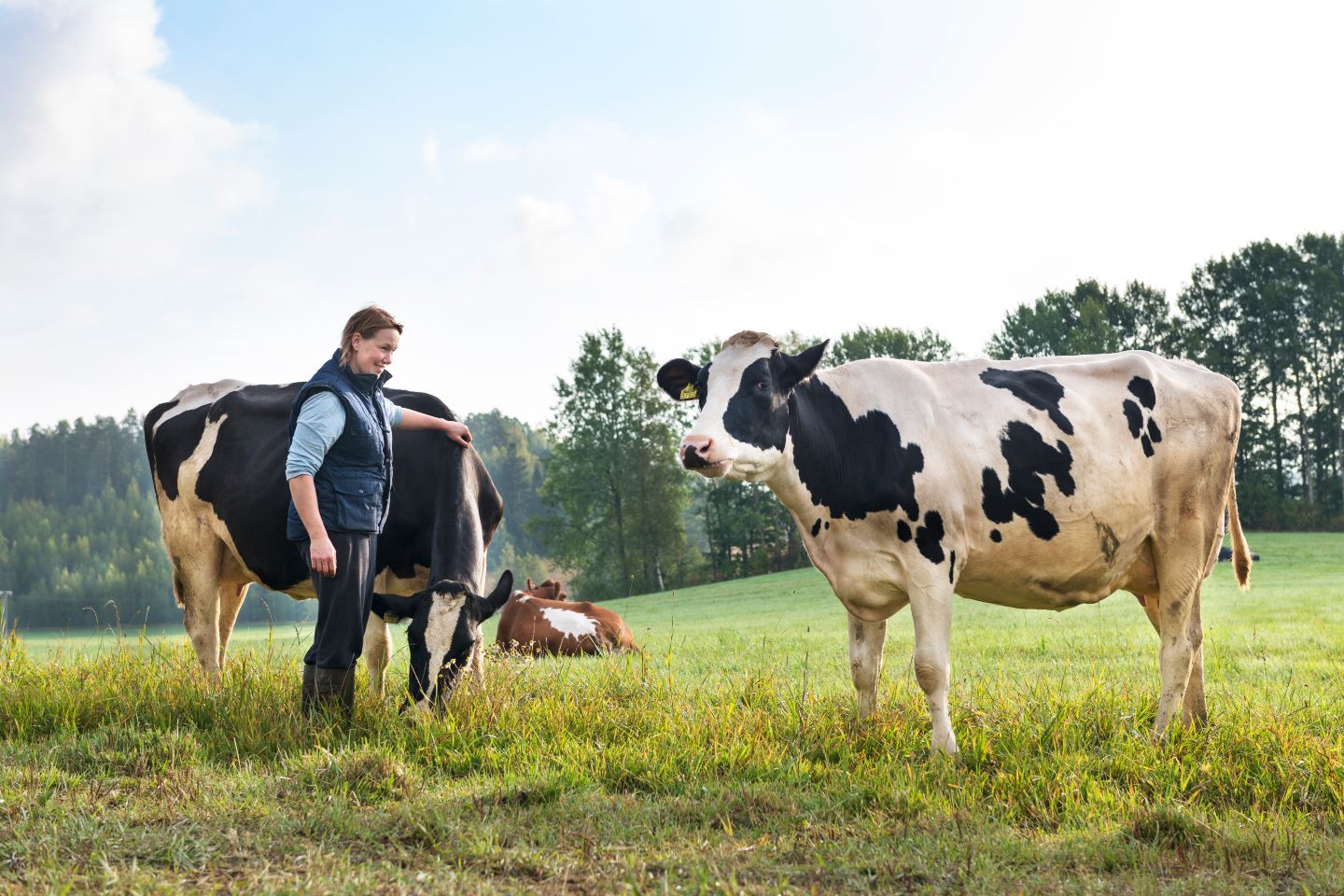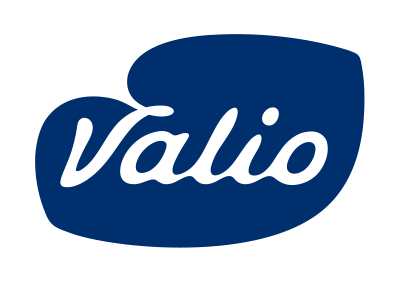
Animal welfare
A healthy cow produces pure, high-quality milk. Systematic and preventive healthcare is essential to animal welfare. Animal welfare on Valio farms is good by international standards, and the milk we produce is among the cleanest in the world.
In January 2018, we began to pay a sustainability bonus to the farms that invest more in animal welfare than what is required by law. Valio’s sustainability bonus consists of the basic bonus of 1 cent per milk litre, paid to all dairy farm entrepreneurs, and the additional 2 cents per milk litre for voluntary actions. Receiving the basic bonus requires, e.g., that the dairy farm entrepreneur has joined Naseva, the Centralised Health Care Register for Finnish Cattle Herds, and has a healthcare agreement with a veterinarian who monitors the health of the herd.
REQUIREMENTS FOR THE SUSTAINABILITY BONUS:
- The farm is included in Naseva, the bovine health register, and a farm visit by a veterinarian to check up on animal health at least once per year.
- Regular hoof health monitoring and treatment
- Anaesthetics, pain relief and sedation during disbudding, i.e. removal of a calf’s horn buds
- New barns must be built as free-stalls, which allow the cows to move about as they please
- No soy or GMO in feed

TOP-QUALITY MILK
We measure milk quality at many points on its journey from the farm to the dairy. The milk producer monitors milk quality for each cow and the milk temperature in the farm’s tank. Collection drivers inspect the milk’s temperature, smell and appearance, and take samples of the milk. Only milk that meets the requirements can be pumped into the vehicle’s tank. Farm-specific samples are analysed for their composition and bacterial count, among other things. Drivers test the milk for residues of antimicrobial drugs before it is delivered to the production plant’s silo. In 2019, 97.6 percent of Valio Group’s milk was held at the highest quality rating, E.
ANTIBIOTICS ONLY WHEN NECESSARY
Milk producers take care of the health and wellbeing of their animals every day. For example, our milking hygiene and udder health are among the best in the world. That is why we also need fewer antibiotics.
Finland does not use antibiotics mixed in feed as a preventative measure, like many other countries do. If an animal falls ill, it obviously needs treatment. A veterinarian will only prescribe antibiotics when it’s necessary.
When a cow is on antibiotics, its milk will not be delivered to the dairy until a sufficient withholding period has passed and testing shows that the milk is free from trace antibiotics. The responsible use of antibiotics also means that we are helping to prevent the creation of antibiotic-resistant bacteria strains.

We have zero tolerance for antibiotic residue in milk.
FREE-STALL BARNS ALLOW FOR FREE MOVEMENT
Valio’s Milk Production Guidelines state that new barns must be built as free stalls, where the cows can move about freely and graze as a herd. By the end of 2018, roughly half of the barns were free-stall barns, and the number continues to grow. In a freestall barn, cows can choose their own cubicle, and feeding table runs through the middle of the barn, where the animals are free to eat at their own leisure. Milking is done at separate milking stations or by an automatic milking system.
FEWER TIE STALL BARNS
In a conventional tie stall barn, each cow has its own cubicle for feeding, resting and milking. Feed is brought to the cow, and drinking water is provided next to them.
Tie stall barns are gradually being phased out, as most of the dairy farms that are closing, and particularly the smaller farms, have tie stall barns. This phasing out is being accelerated by Valio’s requirement for all new barns to be free-stall.
Even tie stall barns can, with proper care, allow for good animal welfare. Letting the cows outside is especially important. In summer, the law requires that cows that are housed in a tie stall barn must be allowed to graze or walk outside for at least 90 days.
Many farms allow cows to go outdoors in the winters, as well. We encourage our farmers to allow their animals, including youngstock, to have year-round outdoor access.


IN SEARCH OF NEW WEANING METHODS
Calves are weaned from their mothers so that we can begin milking the cow and the calf can have a safe environment. Current free-stall barns are not designed in a way that adequately ensures calf safety among the cows. Calves living with adult animals in the same space are more susceptible to diseases because of their immature immunity.
Prior research shows that weaning stress is higher the longer the calf and mother are allowed to be together. Calves are often held in an individual pen to begin with, so that they can learn to use the nipple buckets. Even then, calves must have contact with other calves. After this, the calves can be moved to the group pen.
Some farms already use a so-called suckling cow practice in which they have one, calm, milking cow to suckle a few calves in the group pen. This allows the calves to suckle as naturally as possible.
Calves are disbudded for safety reasons: other animals and their keepers are safer in free-stall barns when the animals don’t have horns.
PAIN RELIEF FOR DISBUDDING
One condition of the Valio Sustainability Bonus is that if a calf is disbudded, i.e. its horn buds are removed, it must be given sedation, an anaesthetic, and pain relief during the procedure. Sufficient pain medication after the procedure is also a requirement.
Disbudding pain can be managed very effectively. The medication is prescribed by a veterinarian, who very often is the person responsible for the actual procedure.
Disbudding a calf is easier and less harmful to the animal than de-horning an adult animal.
FARM SUPPORT AND MONITORING
To support its dairy farmers in their daily work, Valio has its own veterinarian and roughly 20 advisors that work for the cooperatives, as well as a laboratory service that produces data on feed nutrient content and milk purity, among other things. Valio and its cooperatives also hold a variety of training courses for dairy farmers.
In addition, Valio is actively involved in research and development work that aims for better animal health and welfare. Sometimes, animal care can be jeopardized because of, for example, a farmer’s illness. We have trained our milk truck drivers to take note of possible issues at the farms and to immediately relay these issues to the local cooperative. An expert from the local cooperative will also visit the farm if there is a drop in the quality of their milk or a disruption in its production.
Our goal is to audit 20% of our farms per year. In addition, other development and assistance visits take place at the farms. We are also developing our cooperation methods with healthcare and supervisory veterinarians.

Looking after the health and wellbeing of animals is close to the hearts of dairy farmers Kati Montonen and Markku Pippuri. In addition to 30 dairy cows, the farm manages young stock, cultivates 110 hectares of fields with no outside help, works hard with snow ploughing, and organises cabin rentals.
